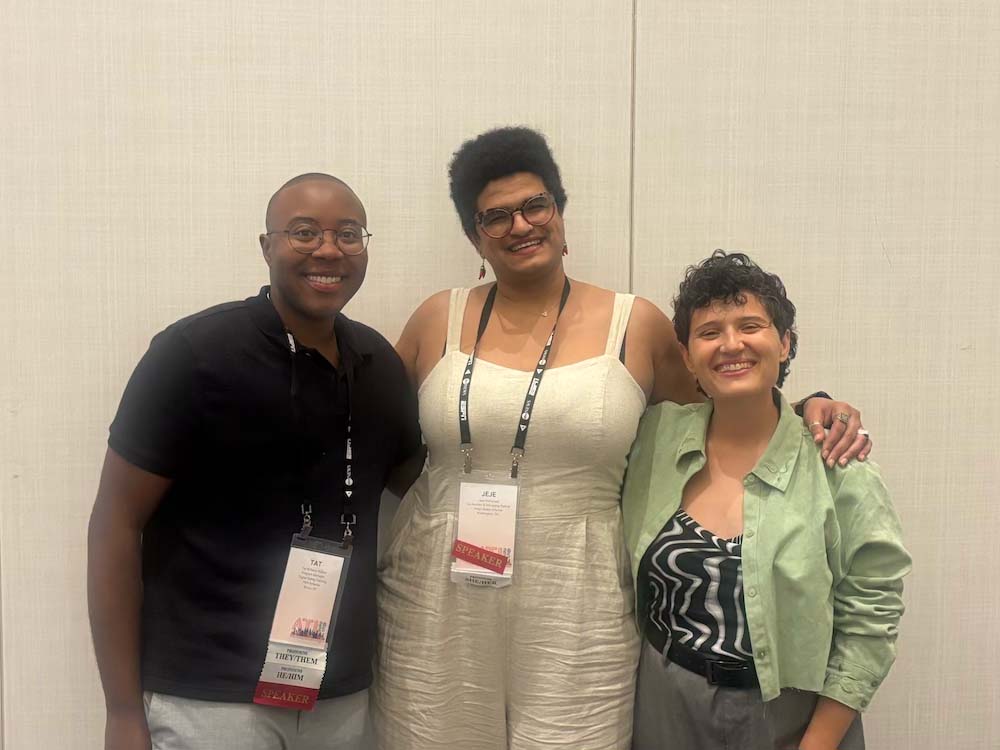At this year’s NLGJA: The Association of LGBTQ+ Journalists Convention, GLAAD and PEN America — a civil society organization that aims to safeguard free expression — came together to lead a critical conversation on digital safety. The session, “De-dox Yourself on Meta: Instagram, Facebook, and WhatsApp,” explored how LGBTQ journalists can better protect themselves from harassment and hate on social media — particularly as platforms roll back key safety policies under the current political climate. More than 700 journalists attended this year’s convention.
The panel featured Jeje Mohamed, Co-founder & Managing Partner at Aegis Safety Alliance; Tat Bellamy-Walker, Program Manager of Digital Safety Training and Resources (Media) at PEN America; and Leanna Garfield, Senior Manager of the Social Media Safety Program at GLAAD. Together, the panelists guided attendees through the current and emerging challenges facing LGBTQ journalists online, and offered practical strategies for protecting one’s digital footprint.
A Changing Policy Environment on Meta’s Platforms
The timing of this session could not have been more urgent. Journalists are grappling with an increasingly hostile environment under the current administration, and several platforms including Meta, YouTube, and LinkedIn, have removed key hate speech protections for LGBTQ people, notably transgender and gender nonconforming people.
In particular, Meta recently ended its third-party fact-checking program in the U.S., introduced explicit allowances for harmful content, and eliminated global safeguards for LGBTQ people, women, people of color, and other historically marginalized groups. GLAAD briefed attendees on the recent specific changes to Meta’s hate speech policy and its content moderation systems, as well as potential implications.
“LGBTQ journalists are facing unique risks online, including rising exposure to harassment and targeted disinformation. This adds to the challenge of balancing public visibility with personal safety,” Garfield said.
Panelists also noted that Meta’s recent rollbacks not only heighten the risks of online abuse, but also erode trust in the broader information ecosystem, making it harder for platforms to serve as reliable spaces for credible news and civil discourse.
Common Harassment Tactics and How to Respond
 Belamy-Walker of PEN America emphasized that online harassment of LGBTQ journalists often takes familiar and repeating forms. These can include: hacking, online impersonation, threats of offline violence, doxxing efforts that reveal private information like addresses or phone numbers, targeted misgendering or deadnaming in order to intimidate trans journalists, and mass reporting campaigns that can lead to account suspensions. In some cases, bad actors have also been known to spread false narratives or even doctored images (facilitated by AI tools) to undermine trust in a journalist’s reporting.
Belamy-Walker of PEN America emphasized that online harassment of LGBTQ journalists often takes familiar and repeating forms. These can include: hacking, online impersonation, threats of offline violence, doxxing efforts that reveal private information like addresses or phone numbers, targeted misgendering or deadnaming in order to intimidate trans journalists, and mass reporting campaigns that can lead to account suspensions. In some cases, bad actors have also been known to spread false narratives or even doctored images (facilitated by AI tools) to undermine trust in a journalist’s reporting.
He stressed that understanding these tactics is the first step toward resilience. Journalists who anticipate these forms of online abuse can respond more effectively, whether by documenting incidents for employers, restricting accounts, or reporting to platforms.
“Documenting is especially important because it can help you see patterns in abuse, and whether it is escalating,” Bellamy-Walker said. “We also recommend that you ask allies to help. More reports equals more attention.”
Practical Tools for Self-Protection
Beyond recognizing harassment patterns, the session equipped journalists with practical strategies for how they can better protect themselves across Meta’s platforms. Suggested steps included:
- Locking down personal information by adjusting privacy settings to control who can access your content
- Maintaining separate personal and professional accounts to better protect your private life
- Using Meta’s built-in features, such as muting or blocking, and keyword blocklists that automatically remove inflammatory comments
- Improving privacy by removing location-sharing from all accounts and using encrypted apps, like Signal or Proton, for secure communications
- Strengthening digital security by creating strong and unique passwords, using a password manager, enabling two-factor authentication, and regularly updating devices
These tools, Mohamed noted, aim to empower LGBTQ journalists to maintain visibility while minimizing risk.
Closing Reflections
The session concluded with an interactive dialogue between panelists and LGBTQ journalists, giving attendees the opportunity to raise their own cases, share experiences, and receive tailored guidance based on their professional goals and levels of risk. The exchange highlighted how important it is for journalists to have access to clear information, practical tools, and trusted resources when navigating digital threats.
As LGBTQ journalists anticipate an increasingly hostile political and online environment, the need for vigilance, preparedness, and community has never been greater. By taking steps to protect themselves, journalists can continue doing what they do best: telling stories that matter. To learn more, check out GLAAD’s LGBTQ Digital Safety Guide, Aegis Safety Alliance’s safety resources, and PEN America’s Digital Safety Checklist.
About the GLAAD Social Media Safety Program
As the leading national LGBTQ media advocacy organization, GLAAD is working every day to hold tech companies and social media platforms accountable and to secure safe online spaces for LGBTQ people. The GLAAD Social Media Safety Program produces the highly-respected annual Social Media Safety Index (SMSI) and researches, monitors, and reports on a variety of issues facing LGBTQ social media users — with a focus on safety, privacy, and expression.













